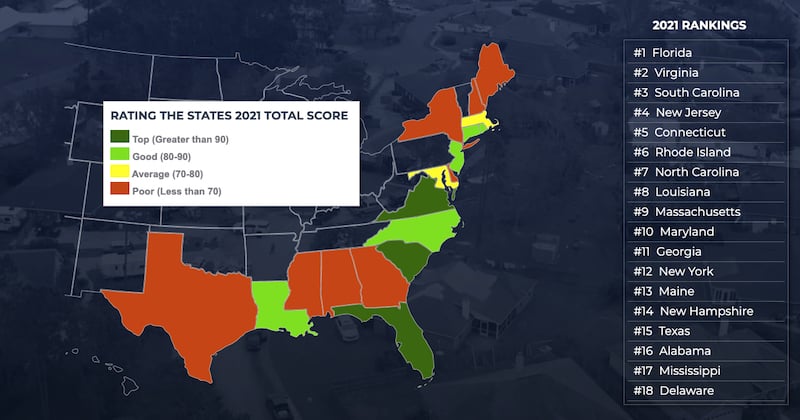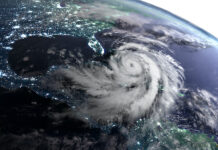A strong building code is critical to reducing the damage and destruction caused by hurricanes each year. Florida once again takes the top spot for strongest building codes with Virginia following one point behind, according to the Insurance Institute for Business & Home Safety (IBHS) 2021 edition of Rating the States. In its signature report, IBHS evaluates building codes and the administration of code provisions along the hurricane coastline from Texas to Maine on a 100-point scale. Florida and Virginia have jostled for the top two spots in all four editions of Rating the States.
“Building science has advanced significantly over the last decade, providing cost effective strategies to reduce the impact of Mother Nature. Modern building codes are core to addressing the known risks of high winds and heavy rain that invariably come with these systems,” says Dr. Anne Cope, chief engineer at IBHS. “Strong adopted and administered codes apply the latest science and engineering knowledge to protect homes and families from the catastrophic damage hurricanes bring and make our coastal communities more resilient for the future.”
In the most recent edition of the report, IBHS researchers identify South Carolina as the state to watch after significant positive code advances between 2012 and 2015. The Palmetto State now comes in at third place. Rounding out the top five are New Jersey and Connecticut. Meanwhile, neighboring North Carolina rates as most improved in the 2021 edition, gaining five points over its 2018 rating.
Massachusetts saw the largest decline of any state coming in three points lower than in the 2018 edition because the state removed the wind-borne debris requirements for coastal areas. Of the 18 states ranked, eight are categorized as “Poor” receiving less than 70 points. Those states, including Georgia, New York, Maine, New Hampshire, Texas, Alabama, Mississippi, and Delaware, lack a mandatory statewide building code.
 Now in its fourth edition, Rating the States is released every three years following the building code update cycle of the International Code Council (ICC). The report scores the 18 Atlantic and Gulf Coast states vulnerable to hurricanes based on a set of questions related to statewide building code adoption, administration, and enforcement and contractor licensing requirements in the adopted building code. It also provides a roadmap each state can follow to improve residential building regulations and reduce the cycle of repeated losses resulting from hurricanes and other severe weather events.
Now in its fourth edition, Rating the States is released every three years following the building code update cycle of the International Code Council (ICC). The report scores the 18 Atlantic and Gulf Coast states vulnerable to hurricanes based on a set of questions related to statewide building code adoption, administration, and enforcement and contractor licensing requirements in the adopted building code. It also provides a roadmap each state can follow to improve residential building regulations and reduce the cycle of repeated losses resulting from hurricanes and other severe weather events.
“Community resilience is something we should all care about – it is not only about protecting people and homes, it is also important to the economic health of our towns, cities and counties,” said Sara Yerkes, Senior Vice President, Government Relations, ICC. “The faster a community can recover from a natural disaster, the faster life returns to normal. The 2021 IBHS Rating the States report is a great advocacy tool for state disaster mitigation plans that incorporate the adoption of current codes, strong administration of those building regulations, and the importance of licensing and training for all building industry professionals.”
“Taking key steps like implementing or updating building codes not only reduces the risk of future storm impacts, but also increases community resiliency and livability,” said Jimi Grande, Senior Vice President of Government Affairs at the National Association of Mutual Insurance Companies (NAMIC). “That’s why for more than a decade NAMIC has led the BuildStrong Coalition’s efforts to enact a transformational shift in the way the federal government approaches catastrophes by making more money available to states and communities to undertake risk-mitigating activities – including those relating to modern building codes – before a natural disaster strikes. Rating the States will be an invaluable tool for those policymakers who are accessing the newly available funds in FEMA’s Building Resilient Infrastructure and Communities Grant Program.”
Explore the full 2021 Rating the States report to see where coastal states rank and how each state can improve.


















![[VIDEO] Collect Asset Data at the Speed of Walking a Building](https://facilityexecutive.com/wp-content/uploads/2024/02/maxresdefault-324x160.jpg)